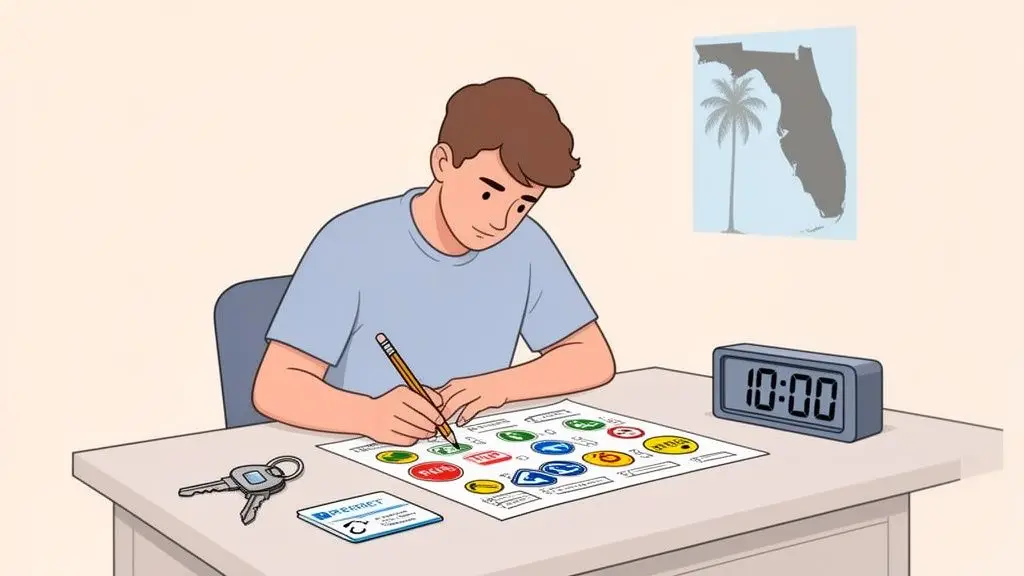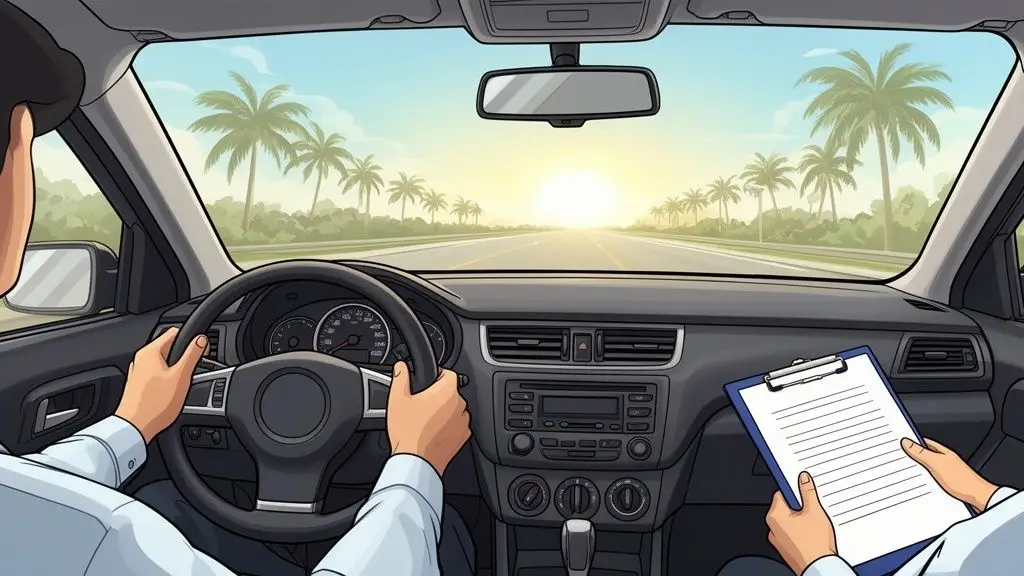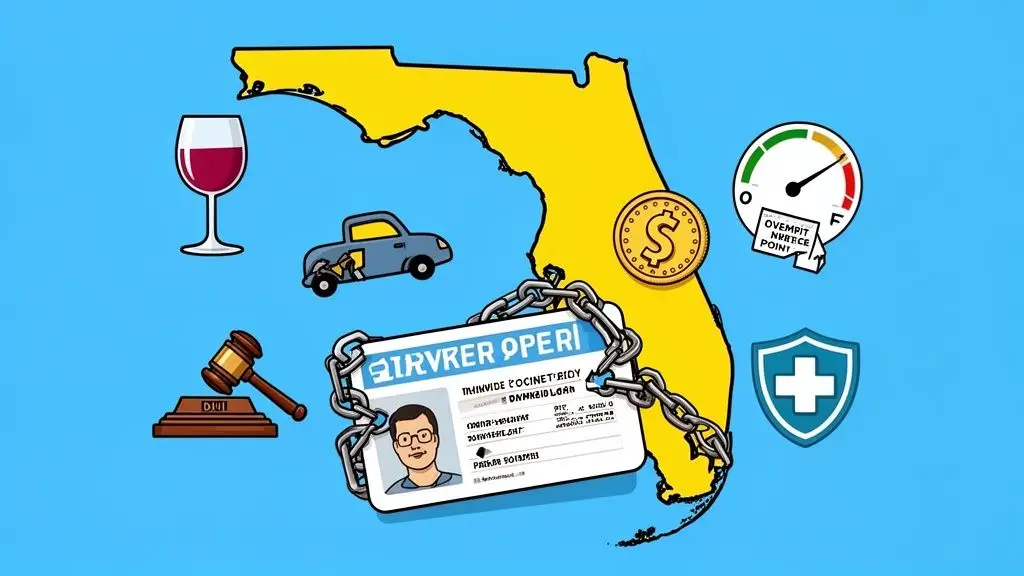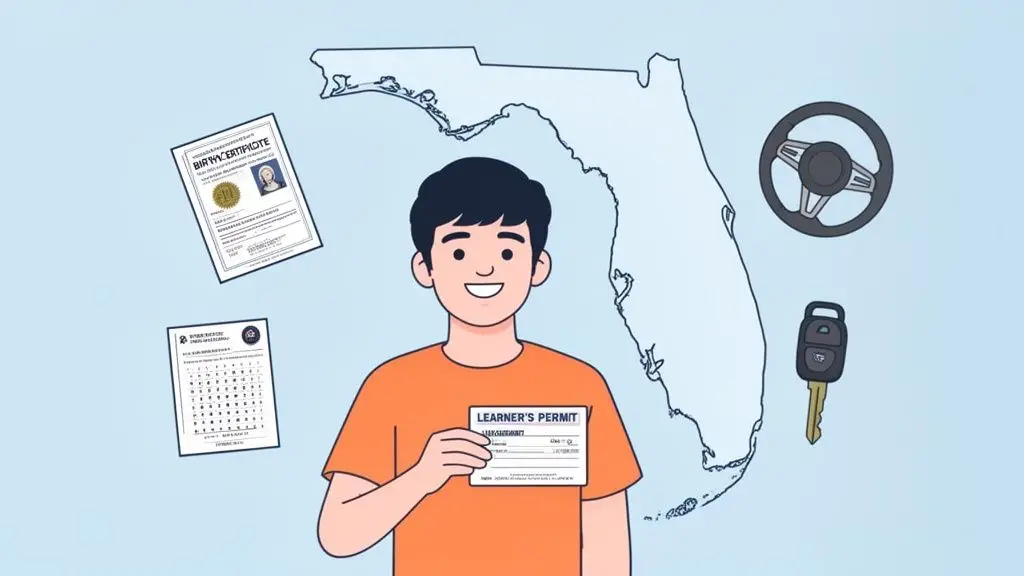Getting an official-looking envelope in the mail with a
red light camera ticket is never a good feeling. If you’ve received one, or just want to understand the rules of the road better, this guide is for you. In Florida, these cameras are legal under a law called the
Mark Wandall Traffic Safety Act, and knowing how they work can help you be a safer driver and maybe even save some money. Taking a
bdi course or a
basic driver improvement course can be a great way to handle a
traffic citation and improve your skills. Let’s break down everything you need to know about
red light cameras Florida, from the law to your options if you get a ticket.
How Florida’s Red Light Cameras Actually Work
So, what exactly triggers that camera flash? It’s a very specific process, and understanding it is key. You can think of it like a simple rule in a game. The system isn’t trying to catch you if you’re already in the middle of the intersection when the light turns red. The problem happens the moment your vehicle’s front tires cross the big white stop line
after the light is already red. That’s the exact thing the camera’s sensors are looking for. This technology became the same across the state in 2010 with the
Mark Wandall Traffic Safety Act, as detailed in Florida Statute 316.0083. You can find the full text on the official Florida Statutes website. This law was named for a man who was killed by someone running a red light. When the system thinks it sees a car break the rule, it takes two clear photos and a
12-second video to show what happened. You can read more about this law from the Florida Department of Highway Safety and Motor Vehicles.
From Flash to Mailbox: The Violation Process
A camera flash doesn’t automatically mean a ticket is on its way. In fact, a person has to look at it first to make sure it’s fair. First, a trained person looks at the photos and video. If they think a car broke the rule, the pictures and video are sent to the local police department. Then, a real police officer gives it the final look. Only if that officer agrees that a car ran the red light is a Notice of Violation mailed to the person who owns the car. Here’s how it happens, step by step:
- Detection: The camera’s sensors see a car cross the stop line on a red light.
- Capture: Clear photos and a short video are automatically recorded.
- Review: A trained police officer looks at the proof to be sure a rule was broken.
- Issuance: If it’s confirmed, a Notice of Violation is sent to the car’s owner.
This system has checks in place to make sure only real violations result in a notice. This image shows just how straightforward the process is.
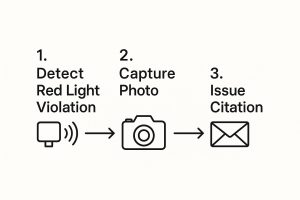
As you can see, a person always checks the proof, making sure the violation is real before you are ever contacted.
What Makes a Red Light Camera Notice Different?
It’s important to understand that a Notice of Violation from a camera isn’t the same as a ticket an officer hands you. They have different results, especially for your driving record. A red light camera notice is a city ordinance violation, not a moving violation like a speeding ticket. The table below shows the main differences.
| Feature | Red Light Camera Notice of Violation (Ordinance) | Standard Traffic Ticket (From Officer) |
|---|
| Initial Penalty | $158 fine, no points on your license if you pay on time. | Varies by county; includes points on your license. |
| How It’s Issued | Mailed to the car’s registered owner. | Given directly to the driver during a traffic stop. |
| Impact on Insurance | Not reported to your insurance company (if paid). | Can make your insurance rates go up. |
| Grace Period | 30 days to pay the notice before it turns into a Uniform Traffic Citation. | Deadline to pay or fight it is set by the court. |
| Contesting It | Can be challenged with a form or a hearing. | You have to go to court to fight it. |
Basically, the first camera notice is like a simple fine. If you take care of it quickly, you can avoid the bigger problems that come with a standard traffic ticket. It’s a question on every Florida driver’s mind: are these cameras just to make money, or do they really make our roads safer? The truth is, while nobody likes getting a ticket,
red light cameras in Florida help protect everyone on the road. The main goal is to make drivers think twice before running a red light. That quick decision can be the difference between a safe stop and a very bad crash.
The Proof Is in the Numbers
The numbers show that these cameras work. Statistics tell a strong story about how they are making traffic safer. For example, a study by the
Insurance Institute for Highway Safety found that in large cities, red light cameras reduced the number of deadly red-light running crashes by 21%. These cameras save lives.
This is a big deal, especially since Florida has had many dangerous accidents. By cutting down on intersection crashes, red light cameras are helping protect not only people in cars but also people walking and riding bikes who share the same space.
Federal Guidance on Safe Camera Use
This isn’t just a local idea; the federal government also sees the value in these systems. The U.S. Department of Transportation and its agencies, like the
National Highway Traffic Safety Administration (NHTSA), have created guides to make sure cameras are used fairly and with safety as the main goal. Here’s a look at the official guidance, which makes it clear that the goal is to keep people safe, not just make money.
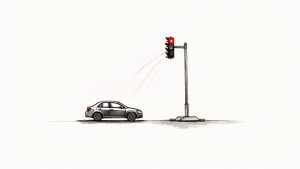
This image shows the press release for the operational guidelines, reinforcing the safety-first approach.
Making Florida Safer, One Intersection at a Time
At the end of the day, red light cameras are one tool to help make Florida’s roads safer. By encouraging safer driving, they help reduce the number of sad accidents at intersections. Of course, even the best drivers can make a mistake. If you get a
traffic citation, taking a
driver safety course is always a smart move. Our state-approved
BDI course is a quick and easy way to handle the ticket and avoid points on your license. A
basic driver improvement course is a great refresher on traffic laws and safe driving, helping you become a safer, more confident driver.
Where Does Your $158 Red Light Ticket Fine Actually Go?
No one likes getting a ticket in the mail, especially a
$158 surprise from a red light camera. But have you ever wondered where that money goes? It doesn’t just disappear. It helps pay for important public services right here in Florida. A big part goes to the city or county where you got the ticket, helping to pay for police and fire departments. Another piece goes to the state, with a special focus on helping Florida’s trauma centers—the places that give life-saving care after bad accidents. So, the system is designed to use the money from a violation to help keep the community safe.

This structure makes sure that the money from unsafe driving helps make the roads safer for everyone.
The Official Breakdown
Florida law is very clear about how that
$158 fine is split up. Every dollar has a job to do that is tied to public safety. Here’s the journey your money takes after you pay that
traffic citation:
- $75 to the Local Government: The city or county that runs the camera gets the biggest piece. This money helps pay for local needs, like police officers or fixing roads.
- $83 to the State of Florida: The rest goes to the state’s general fund, which is then used for different statewide programs.
- $10 of the State’s Share to Trauma Centers: From the state’s part, $10 is specifically sent to the Department of Health to help support the trauma centers that treat the worst crash injuries.
This means every paid fine directly helps the medical centers that are on the front lines of traffic accidents.
What to Do When You Get a Ticket
While it’s interesting to know where the money goes, your first thought is probably, “What do I do now?” You have a few choices. Paying the fine is the easiest way, but you also have the right to challenge it or take steps to keep your driving record clean. If you’re holding a notice and aren’t sure what to do, it’s smart to learn about your options. You can explore our detailed guide on
how to get a ticket dismissed for more information. Often, the best move is completing a Basic Driver Improvement (
BDI) course. A state-approved
traffic school for speeding ticket online like ours lets you avoid getting points on your license, which is the key to stopping a big insurance rate hike. Our
florida online traffic school is a fast and easy way to do this and get your certificate instantly. By taking a
driver safety course, you not only take care of the ticket but also get a good reminder on how to stay safe behind the wheel.
Know the Local Driving Rules in Major Florida Cities
Think of Florida’s state driving laws as the main rulebook for the whole state. But when you drive into a city, you’re playing by that city’s own special rules. These local rules, called
ordinances, cover everything from parking to sharing the road, and they can surprise even longtime drivers. Knowing these local rules is a big part of being a smart, safe driver, especially when it comes to
red light cameras in Florida. Each city has its own way of managing them. It’s important to obey all traffic rules, because they are there to protect you and others. Let’s look at some real-world examples from big Florida cities to help you stay safe and avoid an unexpected
traffic citation.

City-Specific Traffic Ordinances
What’s okay to do in one Florida city might get you a ticket in the next town over. Understanding these differences is the secret to a smooth, safe drive. Here are five examples of local traffic rules you’ll find across Florida:
- Miami-Dade County: This is a good example of a red light camera ordinance. The county’s rules state that every single violation captured by a camera must be reviewed and approved by a trained law enforcement officer before a notice is mailed. This makes sure the process is fair.
- Orlando: Orlando has a city ordinance about “no cruising” zones. In certain parts of downtown, you can’t drive repeatedly past the same point in a short amount of time. This rule is meant to reduce traffic jams and noise.
- Tampa: With so many e-scooters, Tampa created specific laws about where you can ride and park them. For example, you can’t ride them on busy sidewalks like the Riverwalk to keep walkers safe.
- Jacksonville: This city has a strong ordinance about school buses. Even on a divided highway, drivers going in the opposite direction must stop for a stopped school bus with its red lights flashing, unless there’s a raised median or barrier. This is stricter than the state law to protect children.
- St. Petersburg: To protect people walking, St. Pete has a “complete streets” policy. One ordinance from this policy requires drivers to stop for people in any crosswalk, marked or unmarked, in the downtown area. Drivers can’t just slow down; they must come to a full stop.
How Our Courses Help You Stay Safe
The best plan is always to follow every traffic law, from state laws to local city rules. But mistakes can happen. If you find yourself with a ticket, our
Florida approved traffic schools offer an easy way to handle it. We offer premier tools to solve driver education needs in a fast and easy way, where you get your certificate instantly. We provide a variety of
driver education courses for different situations:
- Basic Driver Improvement (BDI) Course: This 4 hour traffic school Florida course is the best choice for a standard traffic ticket. It helps you avoid points on your license and keeps your insurance rates from going up.
- Advanced Driver Improvement (ADI): For drivers with more serious violations or a suspended license, this 12-hour course is often required by the state to get back on the road. The benefit is meeting state requirements to get your driving privileges back.
- 8-Hour Driving While License Suspended Course: If a judge told you to take this course after being caught driving on a suspended license, this is the one you need. The benefit is that it fulfills court requirements.
- First Time Driver (DETS/TLSAE): Every new driver in Florida must pass this course to get their first learner’s permit. The benefit is learning the basic rules of the road and getting one step closer to your license.
- Wireless Communications Device Safety Course: This course is for drivers ticketed for using a phone in a school or work zone. The benefit is removing points from your license for this specific ticket.
By enrolling in one of our
online driving school courses, you’re not just taking care of a ticket—you’re becoming a smarter, safer driver. You can see all our courses at
https://bdischool.com/courses and get started right away.
Your Smartest Options After Getting a Traffic Ticket
That bad feeling when you see a traffic ticket in the mail is something everyone knows. It feels like a big problem, but you have choices. For most drivers, the smartest thing to do is take a
Basic Driver Improvement course, also known as a
BDI course. Think of it as a simple, good way to protect your driving record and stop your car insurance rates from going up. Our
online traffic school is fully approved by the state of Florida. It’s made to help you keep points off your license—which is the main goal after a ticket. You can finish our
4 hour traffic school Florida course from your home, get your certificate instantly, and put the ticket behind you.
Understanding Your Main Choices
When you get a
traffic citation, you have to make a decision. You usually have three ways to go, and each one has a very different effect on your license and your money.
- Pay the Fine and Accept the Points: This is the easiest way, but it has a downside. Paying the fine means you are admitting you broke the rule, and the state will add points to your driving record. Those points can make your insurance rates go up for years.
- Go to Court to Fight the Ticket: You have the right to fight your ticket. This means going to a judge to explain your side. If you win, the ticket goes away. But if you lose, you have to pay the fine plus court costs, and you’ll still get the points.
- Elect to Take a BDI Course: This is often the best choice. By choosing to complete a state-approved basic driver course florida, you can avoid the points completely. Your driving record stays clean, and your insurance company doesn’t find out.
Why a BDI Course Is Your Best Bet
Choosing a
defensive driving school is about more than just handling a ticket; it’s a smart choice for your money. By avoiding points, you also avoid higher insurance costs, which can save you hundreds of dollars over the next few years. Our
Florida approved traffic schools make this whole process simple. You can do the whole
bdi driving course online, whenever you have time. No boring classrooms, no set times. As soon as you finish, you can download your certificate of completion to give to the court clerk. It’s the easiest and
lowest price on florida traffic school way to handle a ticket and move on.
Our Courses Are Designed for Florida Drivers
We know every driver’s situation is different. That’s why we have a variety of
driver education courses to meet specific Florida rules. Each course is a simple tool made to solve a specific problem.
Florida Driver Education Courses We Offer
Here’s a quick look at the state-approved courses we offer to help Florida drivers. You can find the best
florida online traffic school reviews for our courses.
| Course Name | Who It’s For | Key Benefit |
|---|
| Basic Driver Improvement (BDI) | Drivers with a standard moving violation ticket. | Avoid points on your license and prevent insurance increases. |
| 8-Hour Driving While License Suspended | Drivers ordered by a judge to take a course. | Fulfill court requirements to work toward getting your license back. |
| Advanced Driver Improvement (ADI) | Drivers with serious violations or a suspended license. | Meet the state requirements to get your driving privileges back. |
| First Time Driver (DETS/TLSAE) | New drivers getting their first learner’s permit. | Learn the basics of road safety and earn your first license. |
Whether you’re a new driver or just need to handle a citation, we have a course that fits. We are one of the
best online traffic school options available.
Handle Your Ticket the Smart Way
A single mistake on the road doesn’t have to cause long-term problems. When you choose to complete a
BDI course, you’re taking control. You protect your driving record, avoid expensive insurance hikes, and get a great reminder of safe driving habits. If you received a notice from a
red light camera in Florida, we have special information to help you. You can
read our detailed guide on red light tickets to learn exactly how to handle those citations. Taking care of your ticket is simple. You can enroll in the course you need and get started right away. Get it done, grab your instant certificate, and drive with the good feeling that comes with a clean record.
Super-Speeders Beware: Criminal Charges Ahead
Florida is getting much tougher on extreme speeding, and it’s a change every driver needs to know about. A new “Super Speeder” law starts on
July 1, 2025, and it completely changes the rules. We’re not just talking about a big fine anymore; this law makes reckless speeding a criminal offense with very serious results. This new law, from
CS/HB 351, is aimed at drivers who treat public roads like a racetrack. Starting July 1, anyone caught driving
50 mph or more over the speed limit, or driving at
100 mph or higher no matter the speed limit, will be charged with a criminal offense. You won’t just get a ticket. You’ll face a criminal charge, and the punishments are tough.
The Consequences are Serious
Let’s be clear: the state is sending a strong message that this kind of dangerous driving is not okay. The punishments are big, especially if you’re caught more than once.
- First Offense: For a first-time charge, you could face up to 30 days in jail and a $500 fine.
- Second Offense: If you get caught a second time within five years, the punishment gets much worse. You could face up to 90 days in jail, a $1,000 fine, and you could even lose your license.
This is a huge change. What used to be an expensive
traffic citation now becomes a criminal charge that can follow you for life. A criminal record can make it hard to get a job, rent a home, or even get a loan. You can read the full text of this new law for yourself on the official
Florida Senate website.
Why This Law Affects Every Florida Driver
Even if you would never dream of driving that fast, this law is a serious reminder for everyone to obey traffic laws. Speeding is a top cause of terrible accidents, and this law is meant to prevent the worst ones.
Think about it this way: the National Highway Traffic Safety Administration (NHTSA) found that speeding was a part of 29% of all traffic deaths in a recent year. This law is a direct effort to lower that number and make Florida’s roads safer for everyone.
Your best defense is always to follow the speed limit and drive safely. But mistakes can happen. If you do get a traffic ticket of any kind, how you handle it is important. Choosing a
basic driver improvement course is almost always the smartest thing to do. Our
florida traffic school online gives you a quick and easy way to handle a ticket, keep points off your license, and stop your insurance rates from going up. We offer the best
driver training course options that let you get your completion certificate instantly. Take a look at all our
Florida approved traffic schools at
https://bdischool.com/courses and get started today.
Got Questions About Florida Traffic School? We’ve Got Answers.
Even after explaining all of this, you might still have a few questions about handling a red light camera ticket. That’s totally normal. Let’s answer some of the most common questions we hear from drivers every day.
What’s the Easiest Way to Handle a Florida Traffic Ticket?
Honestly, the simplest way is usually to sign up for a
Basic Driver Improvement (BDI) course. Choosing a state-approved
online traffic school means you can finish the course right from your home, on your own time. The best part? You keep the points off your license, which is the key to avoiding a big jump in your next insurance bill. This is why people search for
cheap traffic school florida and
traffic schools near me.
How Long Do I Have to Decide on a BDI Course?
You need to act fast. Once you have that
traffic citation in your hand, the clock starts. You have
30 days from the date on the ticket to tell the county’s Clerk of Court that you’re choosing to take a
driver safety course. If you miss that 30-day deadline, you lose the option. Paying the fine at that point will automatically put points on your license.
Can I Take a Course if I Have a Commercial Driver’s License (CDL)?
Unfortunately, no. If you have a CDL, you are not allowed to take a
BDI course to avoid points for a ticket you get for a moving violation. This rule is the same whether you got the ticket in your big truck or your personal car. This is all explained in
Florida Statute 318.14. For those who want to read the law for themselves, you can see it on the official
Florida Statutes website.
How Many Times Can I Take Traffic School in Florida?
The state lets you use this choice, but not too many times. Florida law lets you choose a
BDI driving course to avoid points once every
12 months, with a limit of five times in your whole life. It’s a great tool for protecting your driving record, but you have to use it wisely. Our
basic driver traffic school florida is made to be the fastest, simplest way to meet the court’s rule, get your certificate right away, and put this ticket behind you.
At
BDISchool, we provide the tools you need to handle your driver education quickly and easily. You’ll get your certificate instantly so you can get back on the road with peace of mind. Ready to keep your record clean?
Register for your course today.
 As you can see, a person always checks the proof, making sure the violation is real before you are ever contacted.
As you can see, a person always checks the proof, making sure the violation is real before you are ever contacted. This image shows the press release for the operational guidelines, reinforcing the safety-first approach.
This image shows the press release for the operational guidelines, reinforcing the safety-first approach. This structure makes sure that the money from unsafe driving helps make the roads safer for everyone.
This structure makes sure that the money from unsafe driving helps make the roads safer for everyone.
 As you can see, a person always checks the proof, making sure the violation is real before you are ever contacted.
As you can see, a person always checks the proof, making sure the violation is real before you are ever contacted. This image shows the press release for the operational guidelines, reinforcing the safety-first approach.
This image shows the press release for the operational guidelines, reinforcing the safety-first approach. This structure makes sure that the money from unsafe driving helps make the roads safer for everyone.
This structure makes sure that the money from unsafe driving helps make the roads safer for everyone.
